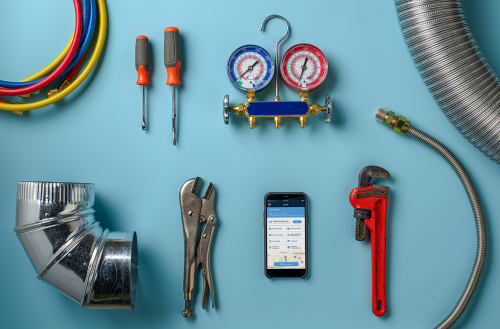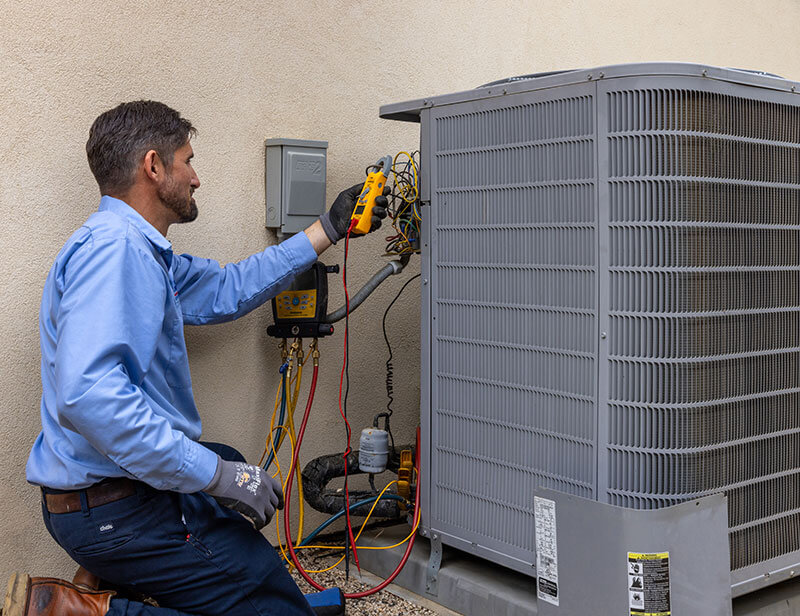Affordable System Upgrades with DMAKS HVAC Expertise.
Affordable System Upgrades with DMAKS HVAC Expertise.
Blog Article
Energy-Efficient Heating And Cooling Systems to Minimize Energy Costs
As power expenses continue to rise, the value of energy-efficient cooling and heating systems ends up being increasingly apparent. These systems not just promise substantial cost savings on energy expenses yet also add to a much more lasting future by lessening power usage. With numerous options available, consisting of geothermal heatpump and ductless mini-splits, homeowner encounter a plethora of options that can boost comfort and air top quality. Nonetheless, recognizing the key functions and upkeep requirements is important to making the most of these advantages. What variables should be prioritized when picking the best system for your requirements?
Benefits of Energy-Efficient A/c Systems
Energy-efficient A/c systems supply various benefits that extend past simple price financial savings. By eating less power, these systems contribute to decrease greenhouse gas emissions, aiding to battle climate modification and advertise sustainability.
Additionally, energy-efficient HVAC systems often supply boosted convenience levels. Most of these systems feature innovative technology that enables much better temperature level control and improved air high quality (DMAKS HVAC). This causes a much healthier indoor setting, which is particularly crucial for people with allergic reactions or breathing issues
Furthermore, purchasing energy-efficient HVAC systems can improve residential or commercial property worth. As more customers focus on energy effectiveness, homes and buildings equipped with these systems may draw in higher quotes in the property market.
Sorts Of Energy-Efficient A/c Options
Exactly how can property owners and services choose one of the most ideal energy-efficient HVAC alternatives for their needs? The marketplace uses a variety of energy-efficient heating and cooling systems, each made to boost convenience while decreasing energy intake.
One choice is the variable cooling agent flow (VRF) system, which effectively controls the temperature in multiple zones within a structure. This system adapts its refrigerant circulation to match the wanted temperature level, resulting in considerable energy savings.
An additional preferred selection is geothermal warm pumps, which use the planet's secure temperature to heat and great rooms. By transferring warm to and from the ground, these systems demonstrate outstanding effectiveness, particularly in modest environments.
In addition, ductless mini-split systems give an energy-efficient choice for homes lacking ductwork. These systems enable for zone-specific home heating and air conditioning, lowering power waste in vacant locations.
Lastly, high-efficiency heating systems and air conditioners, with sophisticated SEER and AFUE ratings, use reliable climate control while taking in much less power than standard models. By assessing these alternatives, homeowners and businesses can select a HVAC system tailored to their specific needs and energy efficiency objectives.
Secret Attributes to Consider

Next, explore the kind of compressor used in the system. DMAKS HVAC. Variable-speed compressors can adjust their outcome to match the home heating or cooling demand, causing boosted comfort and power savings contrasted to single-speed versions. In addition, look for systems geared up with smart thermostats that offer programmable settings and remote gain access to, permitting far better control over energy consumption
Another crucial function is the system's air purification capacity. High-efficiency filters can boost indoor air high quality and minimize power usage by making sure the system operates effectively. Take into consideration the type of refrigerant made use of; modern systems commonly utilize green cooling agents that have a reduced ecological impact.
Lastly, make sure that the system works with zoning innovation, which allows for personalized temperature control in various locations of your home, boosting convenience while decreasing energy usage.
Tips for Choosing the Right System


Following, consider energy efficiency ratings, specifically the Seasonal Power Effectiveness Ratio (SEER) for cooling down systems and the Annual Fuel Usage Efficiency (AFUE) for heating unit. Greater rankings suggest higher effectiveness, which can lead to substantial savings on utility expenses in time.
Furthermore, examine the type of heating and cooling system that ideal matches your way of life and budget. Choices include central air conditioning, ductless mini-splits, and warm pumps, each with its very he said own collection of benefits and disadvantages.
Don't ignore the value of appropriate setup and sizing; an improperly sized system can lead to inefficiencies and enhanced wear. Seek advice from with a specialist Heating and cooling service provider to acquire skilled recommendations customized to your home's distinct needs. This thorough method will make certain that you pick an energy-efficient HVAC system that meets your demands and spending plan effectively.
Upkeep for Optimal Effectiveness
As soon as the appropriate cooling and heating system is in area, continuous maintenance ends up being crucial to guaranteeing optimal efficiency and long life. A well-kept system runs extra effectively, leading to lower power usage and minimized utility costs. Regular examinations and tune-ups need to be set up a minimum of twice a year-- as soon as before the air conditioning period and when before the heating season.

Homeowners ought to also be watchful about monitoring their a/c system's efficiency. Unusual sounds, fluctuating temperature levels, or enhanced energy costs can indicate underlying issues that require immediate focus. By resolving these issues without delay, property owners can protect against costly fixings and extend the life-span of their systems.
Buying an upkeep strategy with a qualified technician not just boosts performance however additionally offers comfort, knowing that the system is operating at its best. DMAKS HVAC. Normal hop over to these guys upkeep is for that reason important for sustaining power performance and lowering overall operational costs
Conclusion
To conclude, energy-efficient HVAC systems present a feasible option for lowering energy costs while improving comfort and air high quality. By including sophisticated innovations and choices such as geothermal heat pumps and ductless mini-splits, residential property owners can achieve substantial power financial savings and add to ecological sustainability. Careful consideration of system functions and recurring upkeep additionally makes certain optimal performance, making energy-efficient systems a prudent investment for both financial and ecological advantages.
Report this page